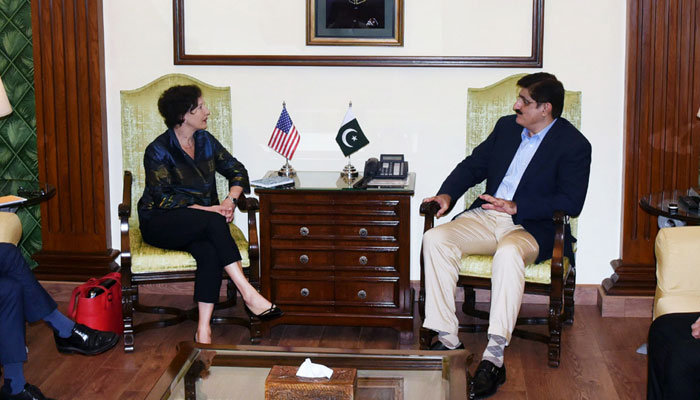CM, US diplomat discuss climate change, social uplift, economy
Sindh Chief Minister Syed Murad Ali Shah and Elizabeth Horst, principal deputy assistant secretary and deputy assistant secretary for Pakistan, US Department of State, met at the CM House on Wednesday and discussed areas of mutual interest, including climate change, social uplift and the economy.
Discussing climate change, Shah said the province suffered significantly in 2022, when heavy rains and floods destroyed over 2.1 million houses. He said that with the assistance of donor agencies and a contribution of Rs57 billion from the provincial government, along with a matching grant from the federal government, the construction of damaged houses has commenced, and 800,000 climate-resilient houses have been built.
He also said his government is seeking donor agencies to provide water, sanitation and hygiene facilities for the houses. “We are also planning to provide them with solar power, for which financial assistance is required.”
The visiting diplomat discussed Karachi being a port city with ample opportunities for investment and development. The CM told her that with the World Bank-funded Competitive & Livable City of Karachi project, efforts have been started to improve the liveability and competitiveness of the city by enhancing institutional performance and supporting activities for private sector investment. The main objective, he said, is to enhance efficiencies in Sindh’s business regulatory environment.
He said his government has started diverting a major portion of the annual budget towards the development of the education sector. He mentioned that his government has made tangible improvements in the health sector, saying that there is still a need to achieve the desired results in education. The US diplomat emphasised the importance of modernising the agriculture sector to transform lives in rural areas. Shah affirmed Sindh’s commitment to this goal, mentioning the province’s work on promoting low-deltaic, high-yield crop varieties.
-
 Travis Kelce Plays Key Role In Taylor Swift's 'Opalite' Remix
Travis Kelce Plays Key Role In Taylor Swift's 'Opalite' Remix -
 How Jennifer Aniston's 57th Birthday Went With Boyfriend Jim Curtis
How Jennifer Aniston's 57th Birthday Went With Boyfriend Jim Curtis -
 JoJo Siwa Shares Inspiring Words With Young Changemakers
JoJo Siwa Shares Inspiring Words With Young Changemakers -
 James Van Der Beek Loved Ones Breaks Silence After Fundraiser Hits $2.2M
James Van Der Beek Loved Ones Breaks Silence After Fundraiser Hits $2.2M -
 Disney’s $336m 'Snow White' Remake Ends With $170m Box Office Loss: Report
Disney’s $336m 'Snow White' Remake Ends With $170m Box Office Loss: Report -
 Travis Kelce's Mom Donna Kelce Breaks Silence On His Retirement Plans
Travis Kelce's Mom Donna Kelce Breaks Silence On His Retirement Plans -
 Premiere Date Of 'Spider-Noir' Featuring Nicolas Cage Announced
Premiere Date Of 'Spider-Noir' Featuring Nicolas Cage Announced -
 Pedro Pascal's Sister Reveals His Reaction To Her 'The Beauty' Role
Pedro Pascal's Sister Reveals His Reaction To Her 'The Beauty' Role -
 Kate Middleton Proves She's True 'children's Princess' With THIS Move
Kate Middleton Proves She's True 'children's Princess' With THIS Move -
 Paul Anka Reveals How He Raised Son Ethan Differently From His Daughters
Paul Anka Reveals How He Raised Son Ethan Differently From His Daughters -
 'A Very Special Visitor' Meets Queen Camilla At Clarence House
'A Very Special Visitor' Meets Queen Camilla At Clarence House -
 Jodie Turner Smith Shares One Strict Rule She Follows As A Mom
Jodie Turner Smith Shares One Strict Rule She Follows As A Mom -
 Hailey Bieber Reveals KEY To Balancing Motherhood With Career
Hailey Bieber Reveals KEY To Balancing Motherhood With Career -
 Photo Of Jay-Z, Other Prominent Figures With Jeffrey Epstein Proven To Be Fake
Photo Of Jay-Z, Other Prominent Figures With Jeffrey Epstein Proven To Be Fake -
 Hillary Clinton's Munich Train Video Sparks Conspiracy Theories
Hillary Clinton's Munich Train Video Sparks Conspiracy Theories -
 Fans Slam Talk Show Host For 'cringe' Behavior In Chris Hemsworth Interview
Fans Slam Talk Show Host For 'cringe' Behavior In Chris Hemsworth Interview




